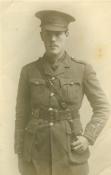
|
The King's School Canterbury |
Roll of Honour |
| Lieutenant Robert Grant CROSSE | |
|
C Company, 7th (Service) Battalion Queen's Own (Royal West Kent Regiment) Date of birth: 15th June 1894 Date of death: 14th July 1916 Died of wounds aged 22 Buried at Peronne Road Cemetery Plot I Row C Grave 2 |

|
| He was born at Canterbury on the 15th of June 1894 the second son of Canon Thomas George Crosse, Vicar of Faversham, and Fanny Maria (nee Nelson) of The Vicarage, Faversham. He was christened at Canterbury on the 16th of July 1894. He was educated at Faversham Grammar School and at the King's School Canterbury from January 1908 to July 1913 where he gained a Junior Scholarship in July 1909 and a Senior Scholarship in June 1912. He played for the 2nd XV Rugby team in 1912/13 and was awarded his colours in 1912. He rowed for the 2nd Boat in 1913 and was awarded his rowing colours that year. He was appointed a House Monitor in September 1911 and a School Monitor in September 1912. He was a member of the Officer Training Corps from June 1909 and was appointed as Quartermaster Sergeant in September 1912. He passed the practical paper for Certificate A in February 1914. He received hunting and military riding instruction at Canterbury Barracks. On leaving King's he went on to Corpus Christi College Cambridge on a Parker Exhibition. Following the outbreak of war he applied for a commission in the Special Reserve of Officers for the infantry on the 7th of August 1914 in an application which was supported by Mr. McDowall, Headmaster of the King's School Canterbury. He was commissioned as a 2nd Lieutenant in the Queen's Own (Royal West Kent Regiment) on the 1st of November 1914. He was promoted to Lieutenant on the 13th of March 1915, and he went to France that summer. On the evening of the 12th of July 1916 his battalion took up positions in the southern end of Trones Wood. The high command had decided that the battalion would clear the remainder of the woods in preparation for a major attack planned for the 14th. The woods were full of shattered trees and enemy strong points and as the orders arrived late in the day on the 13th there was little time to prepare. After a three hour bombardment the attack began at 7pm. The support companies lost heavily due to a German counter barrage but the battalion made good progress and by 7.30pm B Company had reached the light railway which ran through the wood but found that the Germans had filtered back behind them and reoccupied a strong point behind them. A mixed group under Captain Holland dug themselves in along the railway line but were unsupported and under almost constant attack mainly from the direction they had come. Meanwhile nothing had been heard of C Company and Captain Anstruther went forward to find a mixed group of about 150 men from various companies whose officers had all been killed or wounded. He reorganised them by placing 100 men and 6 Lewis guns along the eastern edge of the wood and then took the rest of the men forward. By midnight there were some 250 Royal West Kents in Trones Wood. Captains Holland's party was still isolated, hard pressed and being counterattacked 'vigorously'. Captain Anstruther, in a similar position, declined the assistance of the Middlesex Regiment who offered two platoons to reinforce him as he was succeeding in fighting off the attacks. At daylight the attacks intensified and ammunition was running low but, at 6am, the 12th Battalion Middlesex Regiment and 6th Battalion Northamptonshire Regiment rushed the woods, linked up with the two groups of West Kents and drove the Germans from the woods. The surviving enemy troops were shot down by the group on the eastern side of the woods with their Lewis guns. Casualties were heavy; Lieutenants Skinner and 2nd Lieutenants Cathcart, File, Forsyth and Saveall were all killed or died of wounds with 28 other ranks killed, 23 missing and 174 wounded. Robert Crosse was badly wounded and was evacuated to 28 Field Ambulance where he died of his wounds the following day. His father received the following telegram dated the 19th of July 1916 : - "Deeply regret to inform, you Lieut. R.G. Crosse Royal West Kent Regt died of wounds July 13th (sic). The Army Council express their sympathy. " An interview was conducted with Private 1899 George Gillian 9 Platoon, C Company, 7th Battalion Queen's Own (Royal West Kent Regiment) which was taken at Ward 7, 2nd Southern General Hospital, Southmead on the 17th of July 1916: - "Informant states that on July 13th 1916, at about 7pm at Trones Wood. "I saw Mr. Cross (sic) killed by a shell. He was a few yards from me and died in a few minutes. His body was left in the trench when we retired, I was wounded about 15 minutes after that." He is commemorated on a plaque in St Mary's Church, Faversham, in the church at Ickham and on the memorial at Corpus Christi College Cambridge. His brother, Captain Thomas Latymer Cross (OKS) 7th Battalion Border Regiment, was killed in action on the 3rd of July 1916. |
|
| Day Boy |
Back